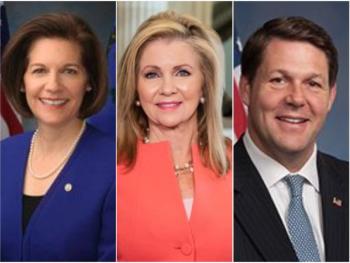
Telehealth gets a win in Trump’s tax package
The legislation includes a provision ensuring Americans can get access to telehealth on a pre-deductible basis. Kyle Zebley of the American Telemedicine Association says the measure helps millions of patients.
Most healthcare leaders have
But there was a key victory for health care in the huge tax and budget legislation signed by President Trump last week, says Kyle Zebley, senior vice president of public policy at the American Telemedicine Association.
Lawmakers inserted a provision that reinstates first-dollar coverage for telehealth for Americans using High-Deductible Health Plan-Health Savings Accounts. And lawmakers made it permanent, which potentially helps tens of millions of people using those plans.
Those Americans can access telehealth services “without having to meet their deductible,” Zebley tells Chief Healthcare Executive®.
“It's a good thing. It is a good policy. It will lead to Americans having more certainty to help them live healthier lives without a hit to their pocketbook,” he says.
The provision wasn’t in earlier versions of the legislation and was added later in the crafting of the bill, Zebley says.
In some ways, it was a bit of an unexpected change to the package. The tax provision related to high deductible health plans expired at the end of 2024, and
Telehealth supporters are celebrating the fact that the provision allowing first-dollar coverage is back, and it’s permanent. The measure is also retroactive to Jan. 1. “That was no sure thing,” Zebley says.
“There are very few other elements of federal policy, going all the way back to the pandemic, that are permanent,” he says. “Congress loves to and by habit, does these short-term extensions. Not this time. It's permanent, fixed policy that organizations, employers, employees can depend on for years to come.”
At the same time, the telemedicine association recognizes that hospitals and other healthcare providers are gravely concerned about the impact of the tax legislation, particularly with reduced spending on Medicaid.
“We are deservedly grateful and appreciative for what was able to be included in the package,” he says. “Regarding the other provisions in the law, it's no secret that it's caused some concern and consternation amongst health systems and healthcare providers across the country and advocates for Medicaid beneficiaries.”
The association is going to watch how the other elements of the law are enacted, with some provisions being phased in over a period of years.
“This leaves us ample time to work with Congress to potentially make adjustments, to work with the administration on how this will be implemented from a regulatory perspective, to work with state governments on hard choices they're going to have to make on their Medicaid coverage,” Zebley says. “And we will be there as the voice of the telehealth virtual care community every step of the way.”
“We're eager to continue to work with our bipartisan champions up on Capitol Hill to get the best possible deal for our community and the patients that benefit from the work of our community,” he adds.
Telehealth advocates still have work to do, and their top priority is extending waivers for virtual care services offered by health systems and other providers.
“I remain very optimistic, and very much expect a high degree of certainty that it will be extended again. There’s essentially universal support on Capitol Hill,” Zebley says.
Most likely, the telehealth extensions will be incorporated in broader federal spending legislation, Zebley says.
While he hopes to eventually see permanent waivers for telehealth and hospital-at-home programs, Zebley says it’s possible that lawmakers will sign off on another temporary extension.
“Based on what we're hearing, we’re going to have another short-term extension,” Zebley says. “But I don't believe that Medicare telehealth flexibilities or the acute hospital care home program will be allowed to lapse.”
It could even be a short-term extension to the end of the year, tied to a broader spending bill to fund the federal government. But Zebley hopes to get a longer extension, and eventually permanent reform.
“We're going to try, and we're going to try as quickly as we can to get it done,” Zebley says.
Larry Bucshon, MD, a former Republican congressman from Indiana and a former cardiothoracic surgeon, told Chief Healthcare Executive in a recent interview that lawmakers in both parties have strong support for telehealth. Bucshon said he expected to see an extension for telehealth programs.
“I think that's going to happen later in the year,” said Bucshon, now a senior policy advisor at Holland & Knight. “Patients like it. Physicians like it.”






















































































